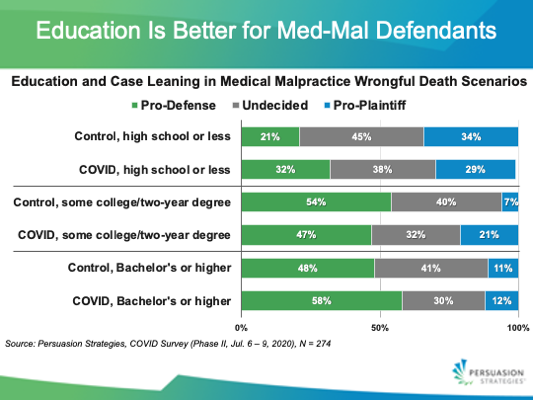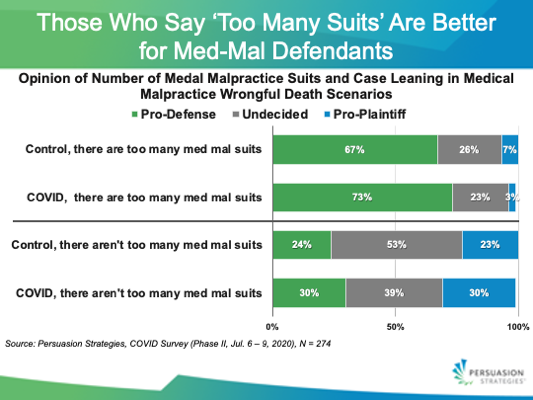
For trial lawyers, there is a great deal of lore on the kinds of jurors you would want for particular cases. While some attorneys will focus on traits like gender, age, or occupation, the smarter course, in my view, is to focus on mental habits and attitudes. In a medical malpractice defense, for example, you will want a jury who can look at the situation analytically and dispassionately, instead of being moved by sympathy, as well as those who have a good respect for doctors and an understanding that they do their best in an often imperfect situation.
Our group tries to keep tabs on some of that lore to see what is supported by data and what isn’t. When you look at the correlations between these traits and expressed leanings in response to a case scenario, you will sometimes find that your intuitions are confirmed, and sometimes find that they’re modified. The Persuasion Strategies group is presently conducting a longitudinal analysis of the attitudes of the jury-eligible population, checking back in with the same group of respondents as they move through the current COVID-19 pandemic. Looking at data recently collected from our third installment, I want to report on one trend we are seeing regarding what makes for a good juror in a medical malpractice defense. In short, a good juror for the doctor is one who is well-educated and who has a skeptical attitude toward litigation and lawsuits. This is true generally, and also true when the case bears on the current medical crisis. In this post, I will share a bit of that data.
Conventional Cases and COVID Cases
Part of what we want to analyze as public opinion transitions through times of coronavirus is whether attitudes will vary when the subject matter of the pandemic bears on the case itself. While it is likely too soon for any of these cases to make it to court, we do feel that in the months and years ahead, issues relating to the pandemic will start to creep into medical cases.
For that reason, we tested two scenarios.
The conventional medical malpractice scenario was as follows:
The family of an individual who died due to heart failure is suing the hospital where the individual was treated. The family claims that the patient died because the hospital was negligent and did not ensure that the patient received adequate care. The hospital claims that the patient did receive adequate care, but the patient’s death was unavoidable.
And the coronavirus-related medical malpractice scenario was as follows:
The family of an individual who died due to COVID-19 is suing the hospital where the individual was treated. The family claims that the patient died because the hospital was negligent and did not ensure that the patient received adequate care. The hospital claims that the patient did receive adequate care, but the patient’s death was unavoidable.
After each scenario, we asked respondents in which direction, knowing nothing else, they would lean and how strongly. In the next sections, I highlight just a couple of the findings that we observed.
Education Matters
An educated juror is better for defendants. And that stands to reason, as someone with higher education is likely to be more experienced and more trained in thinking analytically, a skill which will help them get past sympathy and the brute fact of a bad outcome. The relationship turns out to be pretty robust and statistically significant for both the conventional scenario, as well as the COVID scenario.

This finding also squares with our mock trial experience which shows that the well-educated are typically great defense jurors in many types of medical malpractice cases.
Skepticism of Lawsuits Matters
Individuals who share attitudes that are skeptical of lawsuits (i.e. there are too many lawsuits, awards are too high, there ought to be limits) are also vastly more likely to be pro-defense jurors. Certainly, that stands to reason, but it is important to appreciate that the sheer size of the effect isn’t subtle.

This provides a reminder that, instead of looking at a potential juror and making estimates based on how they look or where they live, it is best to ask what they think. So, as they’re entering a system that looks for medical error and ties monetary awards to that, it makes sense to step back and ask what they think of that system.
____________________
Image credit: 123rf.com, used under license